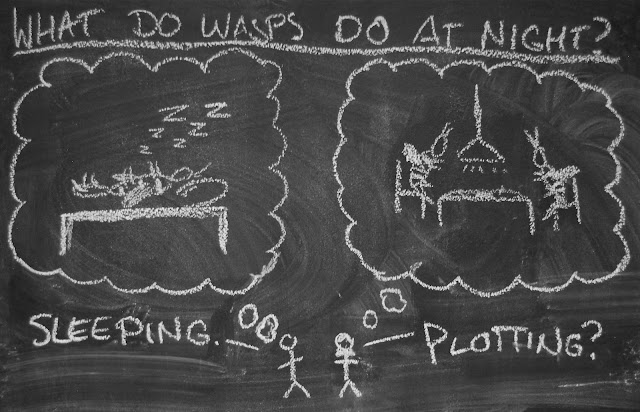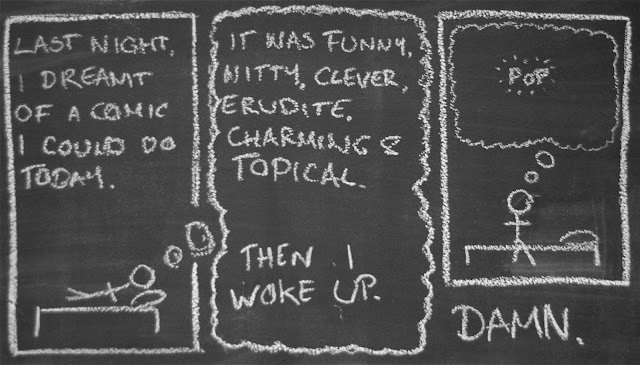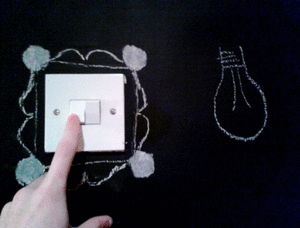I was mugged by a nice man in a green top the other day. His name was Tom. He carried an umbrella (for it was raining) and had tousled hair. He spoke eloquently and quite quickly, and in the brief meeting we had, he managed to exact £8.50 from me.
I left feeling demoralised and guilty, such a fool for giving away my money, hating myself for not doing more to put up a fight, to protect my hard earned cash. I've recently become unemployed, and yet, I gave up £8.50 with a whimper and a desperate urge to get away from the scene of the crime as soon as possible.
Of course, I refer to a charity mugging, and the fact that I'm now giving £8.50 to the NSPCC so they can continue to run Childline, which is understaffed - a third of calls from lonely or abused children don't get through. Undoubtedly, this is a good and worthwhile cause. In some of my forays into youthwork, I've seen the impact of abuse upon children: neglected, vacant, over-sexualised, raucous and uncontrollable. It is obvious that Childline has been, and is, a valuable asset in this country for children wanting to break those cycles of abuse. So why on earth was I so reticent to give my money away? I think there are a few options:
1) I'm a fundamentally bad person. This is a possibility. I sometimes want drivers in souped up cars to crash, or people who give bad customer service to eat something unpleasant. However, I'm not so evil as to want children to keep on being abused.
2) I'm a very poor person. This is nearer the truth. I'm unemployed, and have no income. But poor? So poor as to not afford £8.50 a month (what's that, lunch and a pint of cider?) to help stop the neglect, physical or sexual abuse of defenceless children? That's entirely untrue.
3) I don't like giving. Linking to no. 3, I don't have an income, so giving money away is rather hazardous. One has to be particularly careful that the money you have doesn't become the money you DID have, too quickly. But I'm fine with giving disproportionately. I'm very fortunate to come from a safe and plentiful home, but I know that others aren't. What I have can easily aid those who do not have. Giving is not the problem.
4) I dislike being made to feel guilty for who I do or do not give to. This, I think, is the main reason why I did not want to give money to the entirely just cause of the NSPCC. (Possibly along with being a fundamentally bad person. But mainly the guilt thing.) I only stopped on Friday because Tom smiled nicely, and I usually feel sorry for those guys. But stopping was my mistake. I was never going to walk away from him, for fear of being deemed impolite. He then pulled out all the stops: "I give to 8 charities." "A mother with three kids gave without hesitating earlier, and yet people who earn 10 times as much don't give us the time of day." "These children are the future, and yet we're reticent to give the equivalent of a round at the pub." All these things may be true, they may be lies - in some ways, that's not the point. The point is the effect they create: guilt on the part of the listener. Now, does guilt imply that I'm guilty? Certainly, I've never given to the NSPCC or Childline before. However, does my other giving of my money, time and talents, particularly in relation to the children's and youth work that I've done, assuage my guilt? Not in the mind of the collector.
It's sad, that in this day and age of plenty (which, let's not kid ourselves, it is) we have to be guilt-tripped into giving money. It seems to be the only viable way of charities collecting money - I know it well, I've worked for a church. People generally only respond to appeals for money when they feel a little bit guilty about not doing so. So we walk away from the situation guilty for not originally giving money, guilty for apparently lying ("I'm unemployed and can't really afford it"), guilty for giving up your money when you didn't mean to, and £8.50 poorer.
Yet until we all become a) truly generous, or b) Marxist, I guess we'll have to put up with the guilt, the garish t-shirts, and the misery that is giving to charity.


































 2. What does this even mean?! That you and the Almighty are Skyping? Or maybe - as he's an old-fashioned chap - you're rocking it up on MSN. Perhaps you're even watching the same TV programme at the same time, and sharing all the latest celebrity goss? I suppose you could be MMORPGing together. God's character is pretty much definitely a troll. Fact.
2. What does this even mean?! That you and the Almighty are Skyping? Or maybe - as he's an old-fashioned chap - you're rocking it up on MSN. Perhaps you're even watching the same TV programme at the same time, and sharing all the latest celebrity goss? I suppose you could be MMORPGing together. God's character is pretty much definitely a troll. Fact. 3. Again, what?! LIFE for him? This makes no sense. 'Live' I could perhaps deal with, if it wasn't on a t-shirt, and thus making demands of everyone who reads it. Any ideas?
3. Again, what?! LIFE for him? This makes no sense. 'Live' I could perhaps deal with, if it wasn't on a t-shirt, and thus making demands of everyone who reads it. Any ideas?


 Settling on a new planet is presumably a stressful experience. I wouldn't know, myself, but I'm guessing. However, we are given hints at the characters past lives and mistakes they made on Earth, and how life on Carpathia (the planet is named after the ship that picked up survivors from the Titanic) is a second chance for them. As with every society, they attempt to set up a utopia - and, as with every society, they fail. But what is so key is that the leader of this fledgling society begins to understand that despite the new opportunity, humans are fundamentally selfish people, and there is no getting away from that, however many light years away you are.
Settling on a new planet is presumably a stressful experience. I wouldn't know, myself, but I'm guessing. However, we are given hints at the characters past lives and mistakes they made on Earth, and how life on Carpathia (the planet is named after the ship that picked up survivors from the Titanic) is a second chance for them. As with every society, they attempt to set up a utopia - and, as with every society, they fail. But what is so key is that the leader of this fledgling society begins to understand that despite the new opportunity, humans are fundamentally selfish people, and there is no getting away from that, however many light years away you are.








